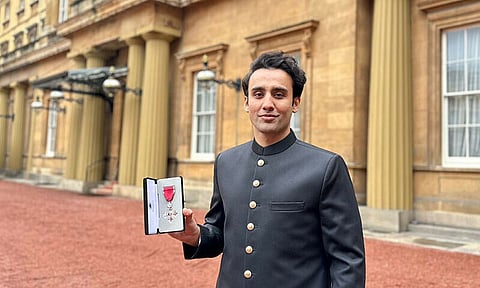Meet Bilal Bin Saqib: How a British-Pakistani humanitarian becomes Pakistan’s crypto czar
In a country where crypto is still banned, one man is leading its digital revolution

Dubai: When Bilal Bin Saqib walked onto the stage at Bitcoin Vegas 2025 in front of U.S. Vice President J.D. Vance, Eric Trump, and Donald Trump Jr. last week, he wasn’t just representing a country, he was reframing it.
There, in the heart of America’s crypto capital, Pakistan unveiled its first Strategic Bitcoin Reserve, a sovereign, state-backed wallet holding digital assets as a signal of belief in the future of decentralised finance. The announcement was bold, unexpected, and, for many back home, bewildering.
Bilal Bin Saqib is CEO of the newly launched Pakistan Crypto Council and Special Assistant to the Pakistan Prime Minister on Crypto and Blockchain. He suddenly came in the limelight in Pakistan recently and made headlines in the country.
After all, Pakistan’s official stance is that cryptocurrency remains banned so far. Both the State Bank of Pakistan (SBP) and the Ministry of Finance have reiterated that crypto transactions are illegal. The law has not changed. And yet here was Pakistan, on the global stage, declaring its intention to become a hub for crypto mining, digital wallets, and Web3 infrastructure led by a 30-something technocrat who’s never been afraid to challenge the status quo.
A different kind of leader
Bilal Bin Saqib is not your typical government official. He holds a Master’s in Social Innovation and Entrepreneurship from the London School of Economics, and he is the founder of Tayaba.org, a nonprofit providing water solutions for underserved communities in Pakistan. That project earned him a spot on Forbes Asia’s 30 Under 30 list.
During the COVID-19 pandemic, he co-founded One Million Meals, which delivered over 100,000 free meals to frontline NHS workers and the homeless in the UK. For his humanitarian service, he was awarded the Member of the British Empire (MBE) by King Charles, presented by Princess Anne.
He is, in every sense, a product of purpose-driven leadership, a person who sees opportunity in crisis, and impact as the only currency that matters.
And yet, the question remains: can a changemaker like Bilal reconcile his bold digital vision with Pakistan’s current legal and financial constraints?
Crypto, confusion, and crossroads
At home in Pakistan, policymakers are sounding the alarm. In a recent parliamentary committee meeting, confusion and concern dominated the discussion. Lawmakers questioned how the country could promote Bitcoin mining while simultaneously outlawing crypto use. Others raised fears about capital flight, money laundering, and the lack of clear regulatory direction.
Finance Secretary Imdadullah Bosal confirmed that cryptocurrency is not legal tender and emphasised that there is currently no parliamentary framework to support digital asset transactions. Even the Financial Monitoring Unit (FMU) is still actively referring crypto cases to law enforcement agencies.
Top 10 country
And yet, Pakistan ranks among the top 10 countries globally for crypto adoption, according to the Chainalysis Global Crypto Adoption Index (2023). It has over 40 million users, a crypto transaction volume exceeding $300 billion annually, and one of the largest freelance economies in the world.
The numbers show that Pakistan is not debating whether to adopt crypto, the people already have.
Built by youth
It is this bottom-up adoption that Bilal is betting on. With over 40,000 IT graduates annually, a tech-savvy youth population, and surplus energy resources, his strategy is to leapfrog Pakistan into a leadership position in the global Web3 economy, before it is left behind.
At Bitcoin Vegas, he announced the allocation of 2,000 megawatts of electricity for bitcoin mining and AI data centers, part of a national effort to monetise surplus power, generate jobs, and attract foreign direct investment.
He also unveiled plans for a new regulatory body, the Pakistan Digital Assets Authority (PDAA), which would oversee compliance, licensing, and the growth of the Web3 ecosystem.
“I am not just here as a minister. I am here as the voice of a generation, a generation that is online, on-chain, and unstoppable,” he said while speaking at the Bitcoin Vegas.
It’s not rhetoric rather it is reality that Pakistan’s youth are not waiting for laws to catch up. They are already participating in the digital economy, with or without government blessing. What’s needed now is leadership that aligns regulation with innovation, and risk with reward.
What next
Critics may call Bilal’s vision premature. But there is something profoundly strategic about a young leader with a background in humanitarian work trying to lift a nation out of economic stagnation through technology. He is not advocating for blind speculation; he is proposing a regulatory framework, infrastructure investment, and global partnerships.
Much like the United States has appointed David Sacks to lead its AI and crypto policy under Donald Trump’s new administration, Pakistan’s elevation of Bilal signals a willingness to experiment with new leadership models, ones that are youthful, global, and agile.
High stakes
The stakes are high. Without a clear legal and regulatory framework, Pakistan risks alienating institutional investors, undermining public trust, and missing out on the next wave of digital economic growth.
But with thoughtful leadership and bipartisan support, this contradiction can become coherence. Pakistan can decide whether it wants to be a bystander or a builder in the future of digital finance.
And perhaps that’s Bilal Bin Saqib’s real message that every nation is a startup, and the ones that embrace failure, iteration, and risk are the ones most likely to survive.
Sign up for the Daily Briefing
Get the latest news and updates straight to your inbox




